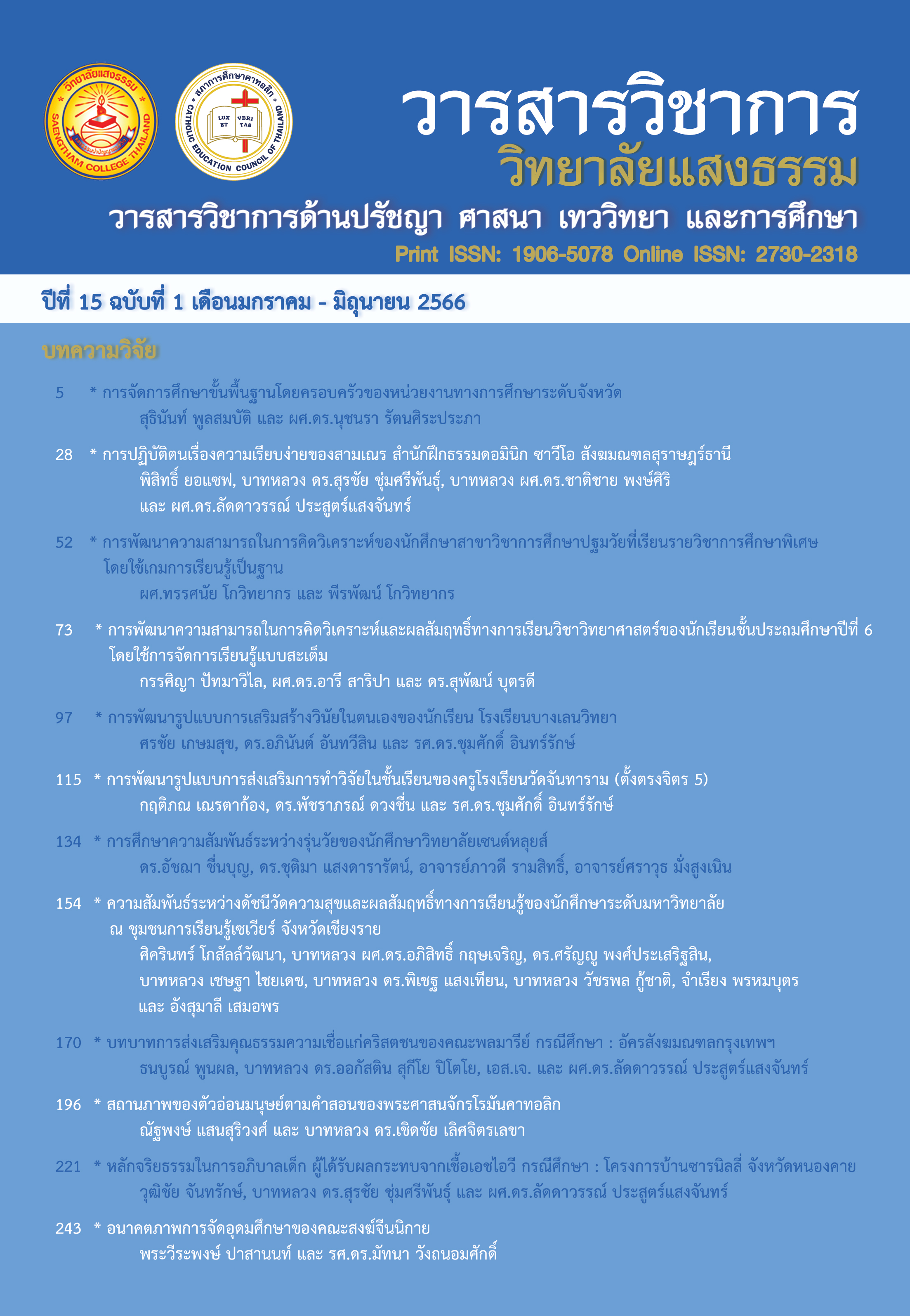The Development of Analytical Thinking Ability for Students in early childhood program of special education course by Using Game-Based-Learning.
Main Article Content
Abstract
The objectives of this research were as follows: 1) to develop of analytical thinking ability of majoring in early childhood students in special education course by using game-based-learning, 2) to compare the analytical thinking ability before and after studying by using game-based-learning for early childhood students in special education course, and 3) to study the satisfaction of early childhood students towards game-based-learning for special education courses. The target groups used in the research were students in the field of early childhood education, faculty of education, 1st semester of the academic year 2019, Suan Dusit University Suphanburi Campus, 3rd year who attended the 1st semester of the academic year 2019 and registered for the 1st semester of the 2019 academic year in special education courses. Total number of 10 students. The research tools were 1) The lesson plan, 2) an observation form for analytical thinking behavior of students, 3) a test to measure the analytical ability of special education courses, and 4) a questionnaire to measure the satisfaction of students who had per game-based-learning for special education course. Statistics used in the research 1) The basic statistics were Mean, Percentage and Standard Deviation. 2) Percentage statistics to compare the analytical thinking ability before and after studying by using game-based-learning for early childhood students in special education course; and 3) the statistics used to determine the quality of the tools were content validity, construct validity, difficulty, discrimination, and reliability.
The results found that
1. Analytical thinking ability of students in early childhood program of special education course by using game-based-learning were in good level.
2. The Analytical thinking ability of students in early childhood program of special education course after studied by using game-based-learning were higher than before the study.
3. The students in Early childhood program were satisfied with the game-based-learning for special education course at the highest level.
Article Details

This work is licensed under a Creative Commons Attribution-NonCommercial-NoDerivatives 4.0 International License.
- The academic and research articles, as well as the content and opinions expressed therein, published in Saengtham College Journal are solely the responsibility of the respective author(s).
- Articles published in Saengtham College Journal are the property of Saengtham College. Reproduction, modification, or dissemination of all or part of the content in any form without written permission from Saengtham College is prohibited.
- Articles published in Saengtham College Journal are protected under the Copyright Act.
References
กฤตนัย ชุมวุฒิศักดิ์ และ ลัดดา ศิลาน้อย. (2558). การพัฒนาทักษะการคิดวิเคราะห์และเจตคติต่อความเป็นพลเมืองตามวิถีประชาธิปไตยหน่วยการเรียนรู้เรื่องพลเมืองดีตามวิถีประชาธิปไตยรายวิชา ส15101 สังคมศึกษา 5 ระดับชั้นประถมศึกษาปีที่ 5 โดยใช้รูปแบบการสอนด้วยเกม (GAME-BASED-LEARNING) The Developing Grade 5 Students’s Analytical Thinking Skill and Attitude Towards Democratic Citizenship in The Learning Unit on “Good Citizen in A Democracy” Social Studies S15101 Course, Using Game-Based-Learning. วารสารศึกษาศาสตร์ มหาวิทยาลัยขอนแก่น, 38(4), 177-184.
ฆนัท ธาตุทอง. (2554). สอนคิด : การจัดการเรียนรู้เพื่อพัฒนาการคิด. เพชรเกษมการพิมพ์.
เจตนิพัทธ์ บุณยสวัสดิ์. (2554). รายงานวิจัยฉบับสมบูรณ์ เรื่องคุณลักษณะของบัณฑิตที่พึงประสงค์ ตามกรอบมาตรฐานคุณวุฒิระดับอุดมศึกษาแห่งชาติของสาขาวิชาอาหารและโภชนาการ. มหาวิทยาลัยเทคโนโลยีราชมงคลพระนคร.
ชนาธิป พรกุล. (2557). การสอนกระบวนการคิด : ทฤษฎีและการนำไปใช้ (พิมพ์ครั้งที่ 3). สำนักพิมพ์แห่งจุฬาลงกรณ์มหาวิทยาลัย.
ทิศนา แขมมณี. (2563). ศาสตร์การสอน : องค์ความรู้เพื่อการจัดกระบวนการเรียนรู้ที่มีประสิทธิภาพ (พิมพ์ครั้งที่ 23). จุฬาลงกรณ์มหาวิทยาลัย.
นภารัตน์ บุตรแดงน้อย. (2560). การพัฒนาเกมเพื่อการเรียนรู้ เรื่องตัวกลางการสื่อสารข้อมูลสำหรับมัธยมศึกษาปีที่ 2. วารสารโครงงานวิทยาการคอมพิวเตอร์และเทคโนโลยีสารสนเทศ, 3(1), 29-35.
บุญเลี้ยง ทุมทอง. (2556). ทฤษฎีและการพัฒนารูปแบบการจัดการเรียนรู้. เอสพริ้นติ้ง ไทยแฟคตอรี่.
พศิน แตงจวง. (2554). รูปแบบการพัฒนาสมรรถนะบุคลากรทางการศึกษา. ดวงกมลพับลิชชิ่ง.
พิมพันธ์ เดชะคุปต์ และพเยาว์ ยินดีสุข. (2563). การเรียนรู้เชิงรุกแบบรวมพลังกับ PLC เพื่อการพัฒนา. โรงพิมพ์แห่งจุฬาลงกรณ์มหาวิทยาลัย.
ไพฑูรย์ สินลารัตน์. (2558). ศาสตร์การคิด. สำนักพิมพ์มหาวิทยาลัยธุรกิจบัณฑิตย์.
วรัตต์ อินทสระ. (2562). Game Based Learning The Latest Trend Education ๒๐๑๙ เปลี่ยนห้องเรียนเป็นห้องเล่น. มปท.
วัชรา เล่าเรียนดี ปรณัฐ กิจรุ่งเรือง และอรพิณ ศิริสัมพันธ์. (2560). กลยุทธ์การจัดการเรียนรู้เชิงรุก เพื่อพัฒนาการคิดและยกระดับคุณภาพการศึกษาสำหรับศตวรรษที่ 21. (พิมพ์ครั้งที่ 12). บริษัท เพชรเกษมพริ้นติ้ง กรุ๊ป จำกัด.
วิจารณ์ พานิช. (2557). วิถีสร้างการเรียนรู้เพื่อศิษย์ในศตวรรษที่ 21. มูลนิธิ สยาม กัมมาจล.
สมศักดิ์ จั่นผ่อง. (2555). ผลของเกมเบสอีเลิร์นนิ่ง (GBeL) ที่ใช้หลักการเรียนรู้ร่วมกันแบบสืบเสาะหาความรู้และการเรียนรู้แบบค้นพบที่ส่งผลต่อทักษะการคิดวิเคราะห์ของนักเรียนชั้นประถมศึกษาปีที่ 6 ที่มีแบบการเรียนต่างกัน. วารสารศึกษาศาสตร์ มหาวิทยาลัยนเรศวร, 14(3), 1-14.
สำนักงานคณะกรรมการการศึกษาแห่งชาติ. (2545). พระราชบัญญัติการศึกษาแห่งชาติ พ.ศ. 2542 และที่แก้ไขเพิ่มเติม (ฉบับที่ 2) พ.ศ. 2545. บริษัท พริกหวานหราฟฟิค จำกัด.
Gifkins, J. (2015). “What Is ‘Active Learning’ and Why Is It Important?”. E-international relations. http://www.eir.info/2015/10/08/what-is-activelearning-and-why-is-it-important.
Johnson, D. W. & Johnson, R. T. (1994). Learning Together and Alone. Cooperative, Competitive, and Individualistic Learning (4th ed). Prentice Hall.
Maria, S., Constantinos, M. (2011). Motivational Aspects of Gaming for Students with Intellectual Disabilities. International Journal of Game-Based Learning, 1(4), 49-59.
Marzano, R., & Kendall, J. (2007). The New Taxonomy of Educational Objectives. Second Edition. https://wiki.adams50.org/.../f/f9/Bprtc/Marzano_taxonomy_verbs.pdf
Meyers, C., & Jones, T. B. (1993). Promoting Active Learning: Strategies or the College Classroom. Josey-Bass Publishers.
White, Kyli and McCoy, Leah P. (2019). Effects of Game-Based Learning on Attitude and Achievement in Elementary Mathematics, Networks: An Online Journal for Teacher Research, 21(1). https://doi.org/10.4148/2470-6353.1259


